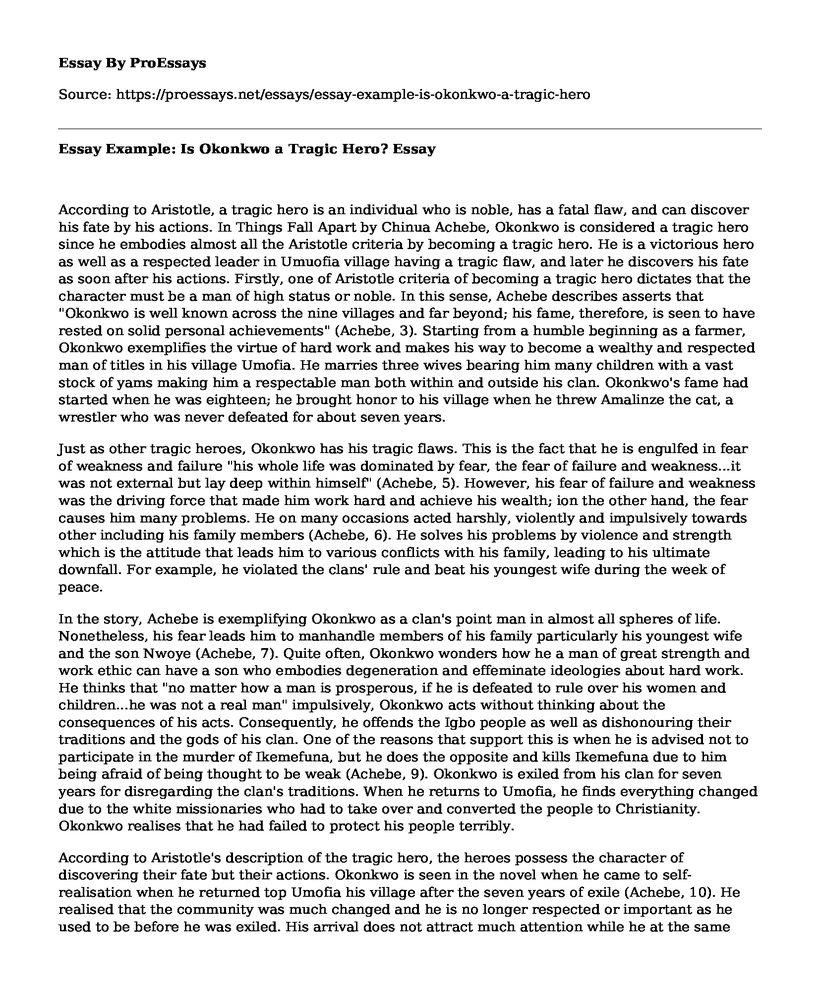According to Aristotle, a tragic hero is an individual who is noble, has a fatal flaw, and can discover his fate by his actions. In Things Fall Apart by Chinua Achebe, Okonkwo is considered a tragic hero since he embodies almost all the Aristotle criteria by becoming a tragic hero. He is a victorious hero as well as a respected leader in Umuofia village having a tragic flaw, and later he discovers his fate as soon after his actions. Firstly, one of Aristotle criteria of becoming a tragic hero dictates that the character must be a man of high status or noble. In this sense, Achebe describes asserts that "Okonkwo is well known across the nine villages and far beyond; his fame, therefore, is seen to have rested on solid personal achievements" (Achebe, 3). Starting from a humble beginning as a farmer, Okonkwo exemplifies the virtue of hard work and makes his way to become a wealthy and respected man of titles in his village Umofia. He marries three wives bearing him many children with a vast stock of yams making him a respectable man both within and outside his clan. Okonkwo's fame had started when he was eighteen; he brought honor to his village when he threw Amalinze the cat, a wrestler who was never defeated for about seven years.
Just as other tragic heroes, Okonkwo has his tragic flaws. This is the fact that he is engulfed in fear of weakness and failure "his whole life was dominated by fear, the fear of failure and weakness...it was not external but lay deep within himself" (Achebe, 5). However, his fear of failure and weakness was the driving force that made him work hard and achieve his wealth; ion the other hand, the fear causes him many problems. He on many occasions acted harshly, violently and impulsively towards other including his family members (Achebe, 6). He solves his problems by violence and strength which is the attitude that leads him to various conflicts with his family, leading to his ultimate downfall. For example, he violated the clans' rule and beat his youngest wife during the week of peace.
In the story, Achebe is exemplifying Okonkwo as a clan's point man in almost all spheres of life. Nonetheless, his fear leads him to manhandle members of his family particularly his youngest wife and the son Nwoye (Achebe, 7). Quite often, Okonkwo wonders how he a man of great strength and work ethic can have a son who embodies degeneration and effeminate ideologies about hard work. He thinks that "no matter how a man is prosperous, if he is defeated to rule over his women and children...he was not a real man" impulsively, Okonkwo acts without thinking about the consequences of his acts. Consequently, he offends the Igbo people as well as dishonouring their traditions and the gods of his clan. One of the reasons that support this is when he is advised not to participate in the murder of Ikemefuna, but he does the opposite and kills Ikemefuna due to him being afraid of being thought to be weak (Achebe, 9). Okonkwo is exiled from his clan for seven years for disregarding the clan's traditions. When he returns to Umofia, he finds everything changed due to the white missionaries who had to take over and converted the people to Christianity. Okonkwo realises that he had failed to protect his people terribly.
According to Aristotle's description of the tragic hero, the heroes possess the character of discovering their fate but their actions. Okonkwo is seen in the novel when he came to self-realisation when he returned top Umofia his village after the seven years of exile (Achebe, 10). He realised that the community was much changed and he is no longer respected or important as he used to be before he was exiled. His arrival does not attract much attention while he at the same time loses his place in the Egwugwug to another man.
Conclusion
In conclusion, Okonkwo characters best fit Aristotle's definition of being a tragic hero. From a humble beginning, Okonkwo rises in stature to the honourable as well as a successful person in Umofia village. At the same time, he finally has a tragic flaw of a fear of weakness and failure which becomes his bait to fall within the community rank, being exiled and becoming "nothing" again in the village. Ultimately, Okonkwo discovers his tragic fate due to his impulsive act of murdering the British court messenger during the clan meeting. The reader is therefore not touched by his suicide because he created the whole scenario.
Work Cited
Achebe, Chinua. Things Fall Apart. Oxford: Heinemann, 1996. Print.
Cite this page
Essay Example: Is Okonkwo a Tragic Hero?. (2022, May 26). Retrieved from https://proessays.net/essays/essay-example-is-okonkwo-a-tragic-hero
If you are the original author of this essay and no longer wish to have it published on the ProEssays website, please click below to request its removal:
- Critical Essay Sample on 1984 by George Orwell
- Compare and Contrast Essay on Oedipus the King and Hamlet
- Paper Example on Mars, The God of War
- Article Analysis Essay on There May Be Flowing Water on Mars but Is There Intelligent Life on Earth?
- Essay Example on Poetry: Expression of Hidden Meanings Beyond Love
- James Baldwin, Hemingway, and Mental Exile in the Metropolis - Research Paper
- Essay on Yolanda's Journey: From Innocence to Understanding War in 'Snow' by Julia Alverez







